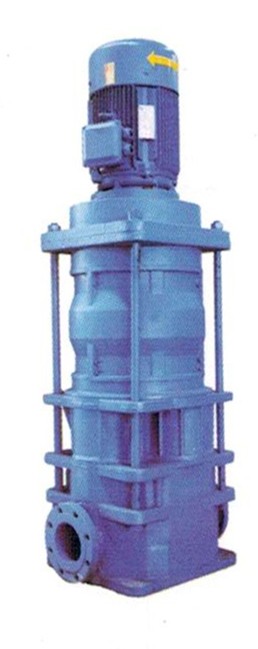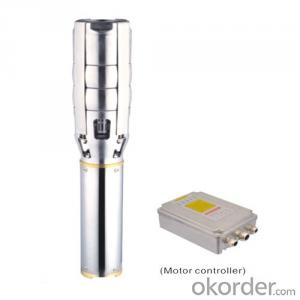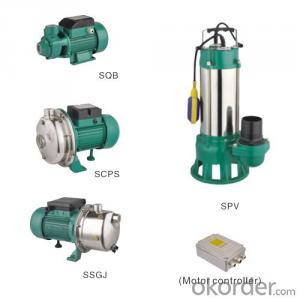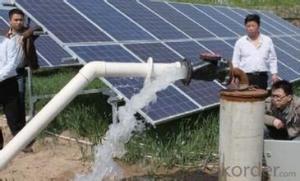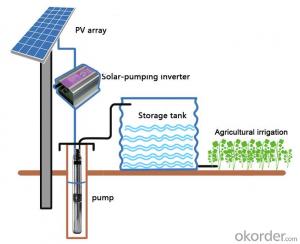Solar Pump Water Well L3D-30-240
- Loading Port:
- China Main Port
- Payment Terms:
- TT OR LC
- Min Order Qty:
- -
- Supply Capability:
- 300 sets unit/month
OKorder Service Pledge
OKorder Financial Service
You Might Also Like
Product description:
Product: Solar water pump
Model:L3D-30-240
Appilication:
surface pump
for surface water of pond, river, lake
for irrigation of a big farm with 20000 m2 on the top of a mountain
Product specification:
flow rate:30m3/ hour, 210m3/day.
lift: 10m-240m
pump diameter: 610mm
Pump installed on the ground, outlet to the water surface:4m
with AC motor, motor power:22kW
but only need solar power:22kW(while Grundfos pump needs at least 45kW solar power, our pump can save more than 50% solar panel power,save USD15000 cost for solar panel per set.
Material:
Pump inside: stainless steel and wearable nylon,it enables our solar pump to have 10 years sevice life.
Motor : AC motor, 380V , three phase , 50Hz. The pump also can connect with grid power directly.
Certification:
3 International patent
ISO9001
CE
Warranty:2 years
- Q: Can a solar pump be used for water supply in electronics or semiconductor manufacturing?
- No, a solar pump cannot be used for water supply in electronics or semiconductor manufacturing as the water quality and purity requirements in these industries are very high. Specialized water treatment and purification systems are necessary, which cannot be provided by a solar pump alone.
- Q: How do I monitor the performance of a solar pump system?
- To effectively monitor the performance of a solar pump system, there are several steps you can take: 1. Installation of monitoring equipment: Begin by installing a monitoring system capable of tracking and recording various parameters of the solar pump system. This may involve the use of sensors to measure solar radiation, pump output, battery voltage, water flow rate, and other relevant variables. The monitoring equipment can be connected to a central control unit or a data logger for data collection. 2. Establishment of performance benchmarks: Determine the desired performance benchmarks or targets for your solar pump system. These benchmarks may include the desired water flow rate, battery charge level, or pump efficiency. Clearly defined benchmarks will aid in the evaluation of whether the system is operating optimally or if any issues require attention. 3. Regular review of data: Consistently analyze the monitoring data to assess the system's performance. This can be achieved by manual analysis of the collected data or through the use of software that presents the data in a well-organized and comprehensive manner. Look for any deviations from the benchmarks and identify any patterns or trends in the system's performance. 4. Conduct periodic performance audits: Regularly evaluate the overall efficiency and effectiveness of the solar pump system through performance audits. This can involve observing the system's operation, on-site measurement of parameters, and comparison of the results with the benchmarks. Performance audits can help identify any inefficiencies, malfunctions, or maintenance requirements. 5. Utilize remote monitoring capabilities: If available, consider utilizing remote monitoring capabilities. Remote monitoring enables access to real-time data and provides alerts or notifications if any critical parameters deviate from the desired range. This proactive monitoring approach allows for early detection of potential issues, facilitating timely corrective actions. 6. Ensure regular maintenance and servicing: Make sure to regularly maintain and service the solar pump system. This includes cleaning the solar panels, checking and tightening connections, inspecting pipes and valves, and testing the overall functionality of the system. Proper maintenance ensures optimal performance and helps prevent any potential breakdowns or inefficiencies. 7. Seek professional assistance: If you are uncertain about monitoring the system independently, consider consulting with a professional solar installer or a technician specialized in solar pump systems. They can provide guidance on the specific monitoring equipment and procedures required for your system, as well as offer expert advice on troubleshooting and optimizing its performance. By implementing these steps, you can effectively monitor the performance of your solar pump system, identify any issues or inefficiencies, and take appropriate actions to ensure its optimal operation.
- Q: Can a solar pump be used for irrigation in agricultural fields?
- Yes, a solar pump can be used for irrigation in agricultural fields. A solar pump is a type of irrigation system that utilizes solar energy to power the pump, which draws water from a source such as a well, river, or pond, and delivers it to the agricultural fields. This system is particularly beneficial in remote areas where electricity supply is limited or unreliable. Solar pumps have several advantages for agricultural irrigation. Firstly, they are more environmentally friendly compared to traditional diesel or electric pumps, as they do not produce greenhouse gas emissions or rely on fossil fuels. Additionally, solar pumps have low maintenance costs and are more cost-effective in the long run, as they do not require fuel or electricity payments. Furthermore, solar pumps can provide a reliable and consistent water supply for irrigation, ensuring that crops receive the necessary water for growth and productivity. They can be designed to operate automatically, based on the availability of sunlight, and can be integrated with sensors and control systems to optimize water usage and minimize wastage. In conclusion, solar pumps are a sustainable and efficient solution for irrigation in agricultural fields. They offer a clean and renewable energy source, reduce operating costs, and provide a reliable water supply for crop irrigation.
- Q: Can a solar pump be used for water treatment or purification?
- Water treatment or purification can indeed utilize a solar pump. These pumps harness the power of the sun to operate, enabling the transfer of water from one place to another. This proves particularly advantageous for water treatment or purification, as it eliminates the need for external power sources and reduces expenses. Various water treatment or purification tasks can benefit from the use of solar pumps. For instance, they can transport water from wells or boreholes to treatment facilities. They can also facilitate the movement of water through different treatment stages, including filtration, disinfection, or desalination. Moreover, solar pumps can circulate water within a treatment system to ensure proper mixing and sufficient contact time with treatment chemicals or processes. Employing a solar pump for water treatment or purification offers numerous advantages. Firstly, it presents a sustainable and eco-friendly solution due to its reliance on renewable energy. Additionally, solar pumps can be installed in remote or off-grid areas where access to electricity is limited or nonexistent. Consequently, they prove suitable for rural communities or underdeveloped regions lacking infrastructure. Moreover, solar pumps often prove more cost-effective in the long run compared to traditional pumps, as they incur lower operational and maintenance costs. Furthermore, they guarantee a dependable and continuous water supply, even during power outages or fluctuations. However, it is crucial to acknowledge that relying solely on a solar pump may not suffice for comprehensive water treatment or purification. Depending on specific requirements and the quality of the water source, additional treatment processes or technologies may be necessary to ensure the safety and potability of the water. In conclusion, a solar pump unquestionably serves as a viable option for water treatment or purification, offering a sustainable, cost-effective, and dependable solution for diverse applications.
- Q: Can a solar pump be used for municipal water supply?
- Yes, a solar pump can be used for municipal water supply. Solar pumps are designed to convert solar energy into mechanical energy, which can be used to pump water from a well or a water source to supply water to a community or municipality. Solar pumping systems can be customized to meet the specific requirements of a municipal water supply, such as the amount of water needed, the distance the water needs to be pumped, and the elevation difference between the water source and the community. Solar pumps have several advantages for municipal water supply, including lower operating costs, reduced dependency on fossil fuels, and a more sustainable and environmentally friendly solution. Additionally, solar pumps can be integrated with storage systems to ensure a continuous water supply even during periods of low sunlight or at night. Overall, solar pumps offer a reliable and efficient option for municipal water supply, particularly in regions with abundant sunlight.
- Q: Can a solar pump be used for water supply in off-grid boats?
- Yes, a solar pump can be used for water supply in off-grid boats. Solar pumps are designed to operate using solar energy, which makes them a perfect solution for off-grid applications. These pumps are typically equipped with photovoltaic panels that convert sunlight into electricity, powering the pump to draw water from a source and supply it to the boat's water system. They are a sustainable and efficient option for water supply, eliminating the need for traditional power sources such as generators or shore power connections. Additionally, solar pumps are often lightweight, compact, and easy to install, making them ideal for use in boats where space and weight are crucial considerations. Overall, using a solar pump for water supply in off-grid boats is a reliable and environmentally friendly choice.
- Q: Can a solar pump be used for water supply in off-grid wineries?
- Yes, a solar pump can be used for water supply in off-grid wineries. Solar pumps are a sustainable and cost-effective solution for pumping water in remote locations where access to electricity may be limited. They harness the power of the sun to operate, making them an ideal choice for off-grid wineries that require a reliable water supply for irrigation or other purposes.
- Q: Can a solar pump be used for fountain or decorative water features?
- Yes, a solar pump can definitely be used for fountains or decorative water features. Solar pumps are an eco-friendly and cost-effective alternative to traditional electric pumps. They are designed to harness the power of the sun and convert it into energy to operate the pump, making them perfect for outdoor water features that may not have access to electricity. Solar pumps are available in various sizes and capacities, allowing you to choose one that suits the specific needs of your fountain or decorative water feature. Additionally, they are easy to install and require minimal maintenance, making them a convenient option for enhancing the aesthetics of your outdoor space while being environmentally conscious.
- Q: Can a solar pump be used for water supply in off-grid botanical gardens?
- Water supply in off-grid botanical gardens can be facilitated by the use of solar pumps. These pumps are an environmentally friendly and sustainable option for remote areas lacking traditional electricity. They function by converting sunlight into electricity through solar panels, which in turn powers the pump to draw water from sources like wells or ponds. Consistent and reliable water supply is crucial for the well-being and growth of plants in botanical gardens. Solar pumps offer an ideal solution for such locations, as they eliminate the need for grid electricity or fuel. Furthermore, they are available in various sizes and capacities to meet the specific requirements of each botanical garden. These pumps can be utilized for irrigation systems, water features, and even to provide drinking water for visitors and animals within the garden. Additionally, solar pumps can be integrated with water storage systems, such as tanks or cisterns, to store water during periods of limited sunlight or high demand. By implementing solar pumps, off-grid botanical gardens can reduce their reliance on fossil fuels and minimize their carbon footprint. Furthermore, they can enjoy the financial benefits of not having to purchase electricity or fuel for traditional pumps. In conclusion, solar pumps offer an efficient and sustainable solution for water supply in off-grid botanical gardens.
- Q: Can a solar pump be integrated with other renewable energy sources like wind turbines?
- Indeed, a solar pump has the capability to be integrated with alternative renewable energy sources such as wind turbines. This integration, referred to as hybrid renewable energy systems, allows for the enhancement of power generation efficiency and reliability. By combining the intermittent nature of wind power with the consistent power generation of solar energy, a hybrid system can provide a more stable and dependable power supply for the solar pump. The integration of a solar pump and wind turbine can be achieved through the utilization of a hybrid controller or an inverter. These devices effectively manage the flow of power between the two sources. The controller ensures that the power generated by each source is efficiently utilized and, if necessary, stored in a battery bank for future use. During periods of low sunlight, the wind turbine can supplement the power requirements of the solar pump, ensuring continuous operation. Similarly, when there is insufficient wind, the solar panels can compensate by providing the necessary power. This hybrid approach maximizes the utilization of available renewable energy resources, reducing dependence on non-renewable energy sources and promoting the overall sustainability of the system. Furthermore, the integration of a solar pump with a wind turbine can also help overcome the limitations of each energy source individually. For example, wind power is generally more abundant at night, while solar power is at its peak during the day. By combining these two sources, the system can provide a more balanced and consistent power supply throughout the day and night. In summary, the integration of a solar pump with other renewable energy sources, such as wind turbines, offers substantial advantages in terms of increased power generation, improved reliability, and enhanced sustainability. This hybrid approach enables a more efficient utilization of available resources and contributes to the overall transition towards a cleaner and more environmentally friendly energy future.
Send your message to us
Solar Pump Water Well L3D-30-240
- Loading Port:
- China Main Port
- Payment Terms:
- TT OR LC
- Min Order Qty:
- -
- Supply Capability:
- 300 sets unit/month
OKorder Service Pledge
OKorder Financial Service
Similar products
Hot products
Hot Searches
Related keywords

